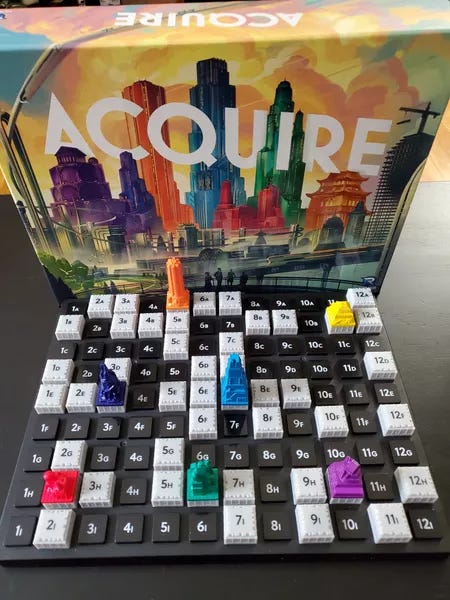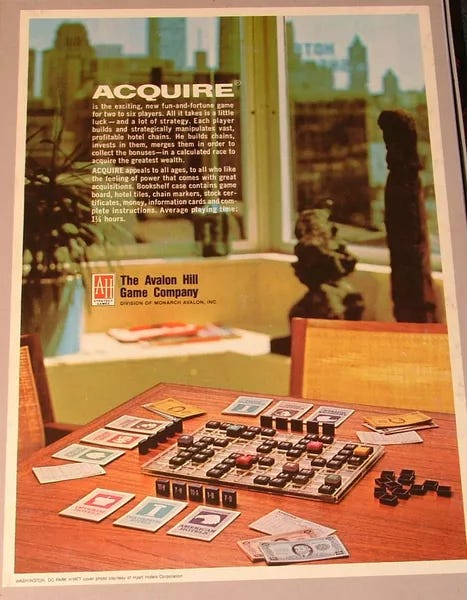Acquire
The Board Game Revolution Started 32 Years Before The World Noticed
If I could only play one board game from the 20th century, I would … be sad. Some people play one game to the exclusion of all else — usually Chess or Bridge — but I prefer variety.
So, I’m not sure I’d pick Sid Sackson’s Acquire as the only game I’d play from last century (if you held a gun to my head and forced me to pick).
But I’m confident it as The Boardgame of the 20th Century.
If you think “Games are for kids” I could pick any number of games to prove you wrong. Acquire got there first.
When you tell someone you play board games, the cliché response is “Oh, like Monopoly?”
Thankfully we’ve progressed past those days, with shelves of games at Barnes and Noble or other bookstores. Gaming hobbyists stores — which used to be relegated to the creepy dives, maybe one per town if you were lucky — have sprouted up across the country in nice welcoming locations.
But “when games were for kids,” you were looking at Monopoly. Parcheesi. Sorry. Maybe Clue.
Those games might have strategy, but also dice. Roll and move. (Yes, even in Clue you roll for how far you can move. It’s been so long since I played that I had to look it up to verify). Maybe you get to make a decision afterwards, but first you get randomness.
Acquire ditched the dice. There is randomness — you get a hand of tiles. But that is closer to cards (or dominoes); you can pick which tile you play. As the tiles go down on the board, hotel chains will form. Players buy stock. When two chains merge, the bigger buys out the smaller, and the largest shareholders in the acquired chain will get a bonus payout, before each player decides what to do with their shares (cash them out, keep them and hope the company re-opens, or trade them into the bigger company).
Apart from granting agency to its players, Acquire is themed for adults. It’s a stock market game. But unlike most stock market games (which were really just buy something and roll the dice to see if it goes up or down), in Sackson’s game value reflected an underlying “real world” valuation. Stocks are priced based on their hotel’s intrinsic quality and how much real estate they control. And unlike Monopoly, the focus is building your portfolio; not crushing your opposition.
From a practical point of view positioning yourself for biggest payout denies that money to your opponents; but nobody goes bankrupt in Acquire. It’s (almost) impossible to lose money.
The design also has no hallmarks that indicates “this is for children.” The original 3M design’s stark simplicity provides an elegant aesthetic.
Kids could play it, but you can also imagine Jon Hamm in a suit — cigarette dangling from his mouth — staring at his hand full of tiles and counting his shares. Silent. Cunning. Planning his next move. Acquire (at least those versions) look dated, true. But elegant. Neither timeless nor tacky.
Acquire also broke with earlier kid’s games because it’s an hour long. An hour. Maybe ten minutes more or less; but predictable. Prior games answered the parent’s desperate cry “Please, for the love of God, give me something to occupy my children during this long winter, so that I do not murder them!” This was not built as a distraction, but as a worthy pursuit by a dedicated game designer (a position that now has hundreds or perhaps thousands of people claiming it on their resume, but back then it was practically unheard of).
Prior games murdered time. The card game War is practically designed not to end. Monopoly can take hours or a full day. Acquire is an hour. It’s not a distraction, it’s an event.
Jon Hamm has things to do, after the important business of crushing you.
So, why is Acquire my “Board game of the 20th Century?” A bit of context.
The big “German game invasion” announced itself to the world with Settlers of Catan (later, just Catan) in 1995. But that style of game had been growing in Germany for 15+ years prior. “German games” or “Eurogames” tended to share the following characteristics:
Players have Agency — your decisions matter and are mostly under your control. There might be luck or even dice, but no-roll-and-move games,
They take a predictable amount of time (normally 60-90 minutes),
Themed around building instead of attacking other players,
Simple enough that children could play, but deep enough that parents could appreciate.
Acquire got there first. By thirty something years.
‘Something’ because the dates are all over the place. Acquire is copyrighted 1962. BGG lists the publication date as ‘64. Game designer and researcher Joe Huber discovered it was originally published in ‘63 in some test markets. He has a detailed article on the development of Acquire and — as an interesting side note — also mentions that Acquire convinced him that games could be for adults.
Unlike many influential games of last century, Acquire holds up. Acquire wasn’t a game that had a cool idea, but then got refined and overshadowed by games that “fixed its problems.” Many of the games that were the most influential of last century are fine, but were left behind by advances in game design or technology.
Not Acquire. It remains a premier “stock” game. Some claim it is all luck; but people say that about Backgammon, too. Acquire is about managing your luck. I wrote a primer on Acquire strategy a decade ago if you are interested (and then almost re-wrote it from scratch five years later, until I realized I’d already written it).
Bookending those moments, I played several times last year. I discovered Acquire in graduate school (and also discovered that many Unix systems have an knock-off implementation, called Hotels, with very bad AI).
(I asked Chat-GPT if it knew the rules and could play Acquire, and it said that since it lacked a Graphical User Interface it would be difficult, but if I gave it a position it could offer advice. I may explore that further. I don’t know how well it would play, but I suspect it would be much better than the Hotels opponent).
Acquire wasn’t the first classic game I discovered; but it was the first classic.
No game is for everyone and even for most people, no game is for every time. Sometimes you want to crush your enemies, or have the game come down to a single die roll or turn of the cards. Maybe you want to explore the factions that made up the Reformation. Or push your luck. Or go full robber baron. There is no “one true game,” just as there is no “one best movie.” Sometimes you want an experience, other times you just want something to give you an excuse to eat popcorn.
But if I had to pick the one true game of last century Sid Sackson’s masterpiece would be my choice.
Which is why Acquire is a First Ballot (no reservations, no hedging) entry into The Twentieth Century Project (and the project is so that I don’t have to limit myself to just picking one).
What do you think? In case you missed the introductory post, the ratings are:
“First Ballot” — One of the Top 20 or 25 games of The 20th Century, and easily in the Top 100.
“On the List” —In the Top 100 of the Century, but not First Ballot and above the Borderline.
“Borderline Yes” — Will probably make the cut, but maybe not.
“Borderline No” — The opposite. Will probably miss the cut, but maybe it will squeak in.
“Missed the Cut” — A good game (otherwise why talk about it?), but not Top 100 material.




No argument, first ballot for me.
Oddly enough, however, by the terms of your initial post, Contract Bridge qualifies as a Game of the 20th Century, although it is not a Board Game so it's not contending with Acquire.
After taking a moment to remind myself that virtually all of the board games I've played and enjoyed recently were developed and published in the 21st Century, yes, this seems like a straightforward first ballot.
I've enjoyed Acquire enough, and the design is solid enough, that I'm pretty sure it makes it into an overall Board Games HoF for me too, but limiting it to the 20th Century cements it.